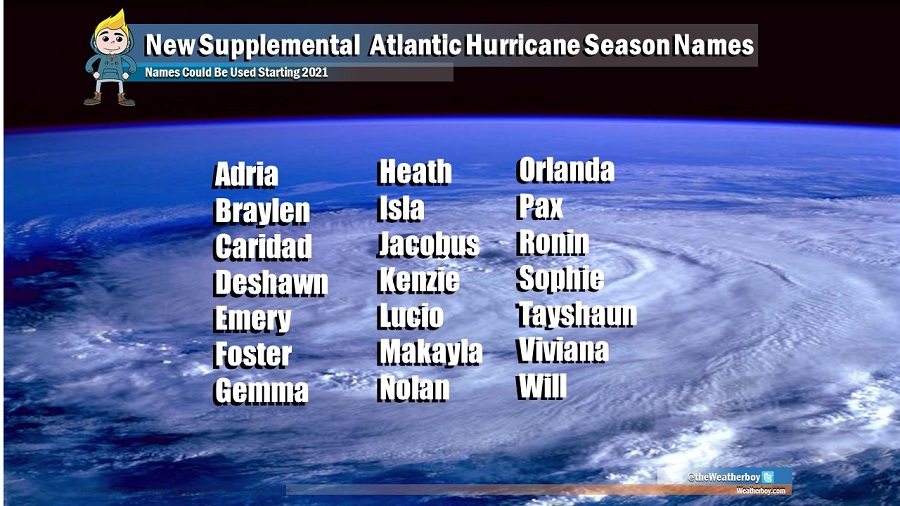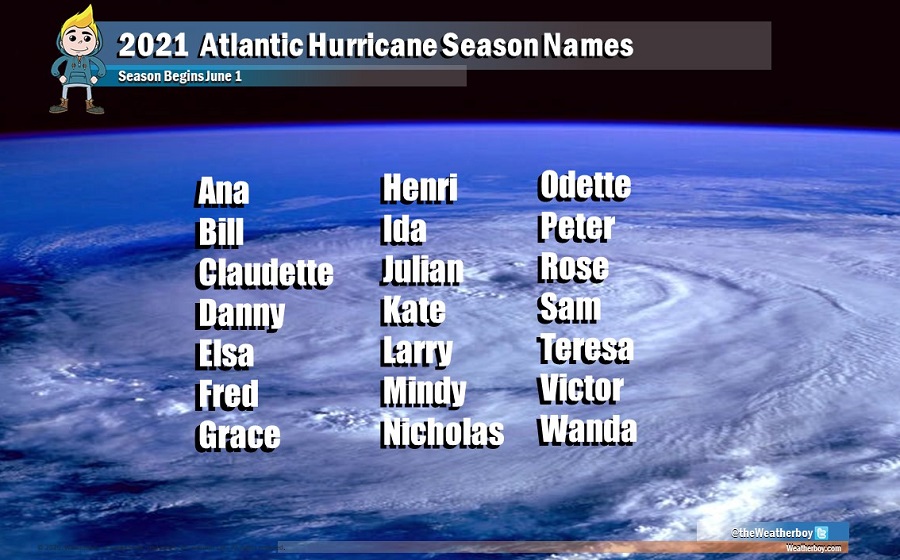
The World Meteorological Organization’s (WMO) Hurricane Committee has announced changes to the list of names that will be used in this and future hurricane seasons in the Atlantic basin. In addition to dropping some storm names and replacing them with new names, the WMO had decided to end the practice of using letters from the Greek alphabet to name storms.
The list of names given to tropical storms and hurricanes in the Atlantic are maintained by the United Nation’s World Meteorological Organization (WMO). Currently, only tropical cyclones are named in an official capacity; winter storms are not. The World Meteorological Organization from the United Nations develops a list of names for each ocean basin. In the United States, the National Hurricane Center maintains lists from the WMO for Atlantic Basin and eastern Pacific basin storms. Storms that form near Hawaii come from a list managed by the Central Pacific Hurricane Center.
Storms are named in alphabetical order each season. “It is important to note that tropical cyclones/hurricanes are named neither after any particular person, nor with any preference in alphabetical sequence,” states the WMO. “The tropical cyclone/hurricane names selected are those that are familiar to the people in each region.” These name lists are recycled every 6 years.
Storms responsible for significant death/destruction are retired at annual WMO meetings. During the WMO Region IV Association meeting which ended today, it was determined that Dorian, Laura, Eta, and Iota would never be used again. The Region IV Association includes North America, Central America, and the Caribbean. In total, 93 names have now been retired from the Atlantic basin list since 1953, when storms began to be named under the current system.

According to National Hurricane Center Director Ken Graham, the retired names Dorian and Laura will be replaced with new names Dexter and Leah.
Hurricane Committee members agreed to create a supplemental list of names A-Z (excluding Q, U, as well as X, Y, and Z on the Atlantic list) that would be used in lieu of the Greek alphabet when the standard list is exhausted in a given season. Names on this list could be retired and replaced, when required. Names beginning with Q, U, X, Y and Z are still not common enough or easily understood in local languages to be slotted into the rotating lists.
The decision to move away from Greek letters was made by different reasons that surfaced in last year’s hyper-active hurricane season. According to Graham, there can be too much focus on the use of Greek alphabet names and not the actual impacts from the storm. Graham said he received a large volume of phone calls when the name “Zeta” was used, detracting from the impact and safety messaging that should have been shared. Additionally, there is confusion with some Greek alphabet names when they are translated into other languages used by the region.
“There was confusion with translation and pronunciation in foreign languages, which led to confusion,” Graham said. The region encompasses areas where English, Spanish, French, and Portuguese are spoken, and sometimes names don’t translate or pronounce well in other languages. In a written statement, the WMO wrote, “the pronunciation of several of the Greek letters (Zeta, Eta, Theta) are similar and occur in succession. In 2020, this resulted in storms with very similar sounding names occurring simultaneously, which led to messaging challenges rather than streamlined and clear communication.”
“The RA-IV Hurricane Committee’s work is critical to keep our nations coordinated well before the next storm threatens”, said Graham, who also serves as the WMO’s Hurricane Committee Chair. “Hurricanes don’t care about international boundaries. We all face similar dangers from tropical systems. Impacts from a single storm can affect multiple countries, so it is critical we have a plan, coordinate our efforts, and share challenges and best practices”.
“This is a partnership; it’s a friendship. We’re in this together…to save lives …together striving to become weather ready nations, ” Graham said as he addressed reporters today.
“Developing countries and small islands in the Caribbean and Central America are increasingly vulnerable to the impacts of tropical cyclones, which can overturn years of socio-economic development in a matter of hours. In 2020, we saw this once again with tragic effect,” says Evan Thompson, President of WMO’s Regional Association for North America, Central America and the Caribbean.
“We cannot prevent this incredible force of nature, but we do have the power to minimize the loss of life and property through cutting-edge forecasts and warnings and strong regional coordination and cooperation,” said Thompson, who also leads Jamaica’s national meteorological service.
Beyond names, there could also be other changes brewing to hurricane season. Starting this year, the National Hurricane Season will begin issuing daily Tropical Outlooks starting on May 15 rather than on June 1, the traditional first day of the season. Conversations and debate continue with whether or not the dates of the hurricane season should be changed, but nothing has been decided on for now.
Graham said social science needs to be considered in addition to climate science when it comes to changing season start and end dates. “The earlier we start, the farther we are from the peak,” Graham cautioned, adding that pushing the season earlier could interfere or overlap with other seasonal severe weather messaging, such as springtime tornado threats.